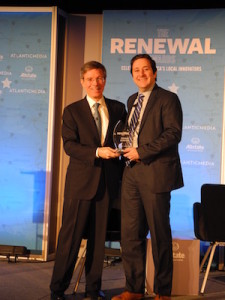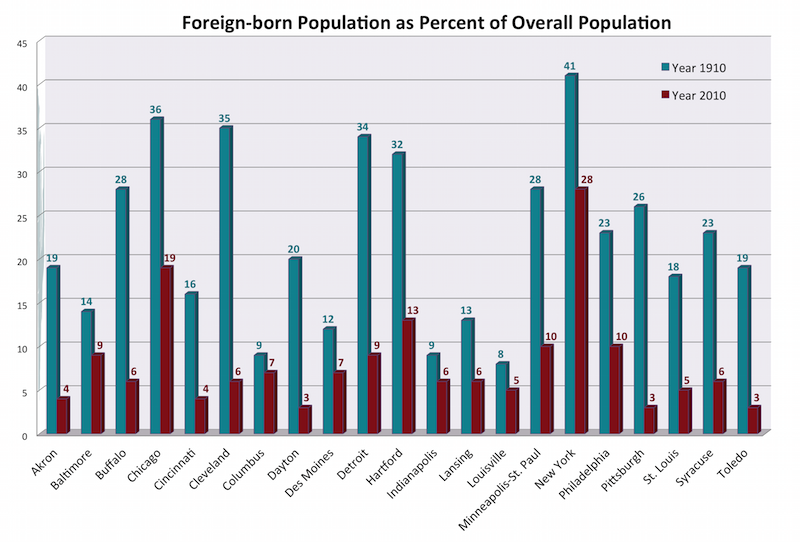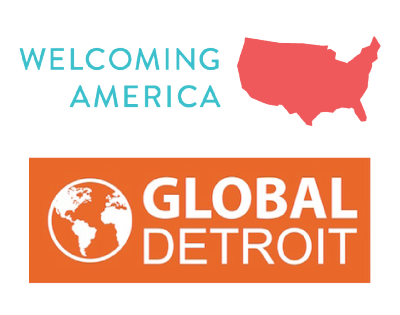Syracuse and Detroit Exchange Strategies for a Holistic Approach
/in All Blogs, Immigrant Small Business Owners, Immigrant Entrepreneurs, Immigrant Entrepreneurship, City-to-City Visits /by gglnadminGlobal Detroit’s Pioneering Efforts Honored with National Innovation Award
/in All Blogs, Immigrant Small Business Owners, Immigrant Entrepreneurs, Immigrant Entrepreneurship, Diversity /by gglnadmin In late January, Welcoming Economies Global Network member Global Detroit was honored to receive one of the first-ever Renewal Awards, created by the National Journal and Atlantic magazines with Allstate, to recognize the innovators, grassroots organizers and problem-solvers who are making progress against the greatest challenges facing America. The awards identify and celebrate the efforts of six nonprofit initiatives across the country that are tackling vital issues, from education to economic opportunity, from health care to neighborhood revitalization.
In late January, Welcoming Economies Global Network member Global Detroit was honored to receive one of the first-ever Renewal Awards, created by the National Journal and Atlantic magazines with Allstate, to recognize the innovators, grassroots organizers and problem-solvers who are making progress against the greatest challenges facing America. The awards identify and celebrate the efforts of six nonprofit initiatives across the country that are tackling vital issues, from education to economic opportunity, from health care to neighborhood revitalization.
National recognition of Global Detroit and its immigrant economic development efforts in Detroit signals widespread acceptance of immigration as an economic development and community renewal strategy. Global Detroit received this prestigious national award on the 5th anniversary of the beginning of its first programs. In the five years since the Global Detroit study and plan were unveiled in 2010, Global Detroit has worked with its partners across metro Detroit to implement no fewer than eight of the eleven strategies in the original Global Detroit study to help the region’s economic recovery by leveraging international talent to fill regional businesses’ unmet talent needs, catalyzing the growth and development of immigrant entrepreneurs, and building a global region with competitive advantages in job creation, business growth, and community development.
Where these ideas were once met by curious looks, they are now met with interest by peers across the Midwest and Northeast, and encouraged by the support of the Network. The environment to renew America’s economy is being set by Global Detroit and its Network peers. Research into the economic impact of immigrants and refugees is easier to come by, and tangible outcomes of immigrant economic development work are evident across the Welcoming Economies Global Network.
The Renewal Awards celebrate innovators that are renewing America from the ground up despite a national system mired in stalemate. Immigration reform is no stranger to stalemate, and any type of meaningful reform appears no closer despite immigration’s now constant (and heated) seat on the political stage. Despite the gridlock in Congress, however – or perhaps because of it – local and regional efforts to effectively integrate immigrants and refugees have surged with newfound allies and energy. Over the last few years, the growth in both number and scope of these programs is astounding, and reveals a strong momentum in the emerging field of immigrant economic development.
This award, an incredible recognition of how far local immigrant economic development efforts have come, honors Global Detroit and motivates its staff, board, supporters, and partners to continue to help revitalize Detroit and the metro region. Our nation still has much work to do to make America the best it can be for all its residents. We hope the Renewal Award is a catalyst for others to work with immigrant communities producing economic opportunity for the entire region by welcoming immigrants and encouraging regional economic development efforts to play a role not just in attracting immigrants, but also in retaining them and in enhancing their role in the community’s economic and social fabric.
Rust Belt Immigrants Propel Economy of Region and Country
/in All Blogs, Immigrant Small Business Owners, Immigrant Entrepreneurs, Immigrant Entrepreneurship, Immigrant Retention, Diversity, New American Fortune 500 /by gglnadmin100 years ago, the Rust Belt was a region of immigrants – a global leader that attracted millions of people from all over the world to contribute to the growth industries of America’s manufacturing base. Immigrants were at the source of much of the Rust Belt’s early 20th Century industrial innovation and propelled much of America’s industrial growth. Their economic contributions helped build the most prosperous middle-class quality of life the world has ever known.
Can you imagine how energized Rust Belt cities would be if their populations reflected anything like the number of newcomers we experienced 100 years ago? See the chart below comparing 1910’s foreign-born populations to 2010’s in our WE Global Network member cities.
The WE Global Network is a collection of 20 Rust Belt economic and community development initiatives focused on revitalizing their cities and regional economy by integrating immigrants. The WE Global Network celebrates Immigrant Heritage Month, a nationwide effort coordinated by Welcome.US to gather and share stories of our shared American heritage, by honoring immigrants’ economic contributions and encouraging a new future in the Rust Belt that welcomes and embraces immigrants, refugees, and internationals.
When talking about immigrant business owners, it’s common to think first of your local corner store, family owned-restaurant, and other small businesses we rely on in every day life. Less often do the well-known logos of the household brands that provided livelihood to our grandparents’ and parents’ generations come to mind, but we now know that many of these companies, too, owe their existence to immigrant innovators. Entrepreneurial immigrants have created some of the world’s largest companies and millions of jobs for American workers. The Partnership for a New American Economy’s “New American” Fortune 500 report explores the latest research on the business contributions of immigrants. Nationally, more than 40% of 2011’s Fortune 500 companies were founded by immigrants or their children. These companies employ 10 million people worldwide, and have combined annual revenues of $4.2 trillion, an amount greater than the GDP of every country in the world but the U.S., China, and Japan.
To celebrate Immigrant Heritage Month, WE Global Network partnered with the Partnership for a New American Economy to examine the contributions immigrants have made to our 10-state region’s largest companies.
The numbers are astounding. “New Americans” (defined for this purpose as an immigrant or the child of an immigrant) in our WE Global Network 10-state region founded 94 of the Fortune 500 companies (2011 data) – that’s nearly one out of every five of America’s largest companies. Furthermore, a New American founded nearly half (45.6%) of the Fortune 500 companies in our 10-state region.
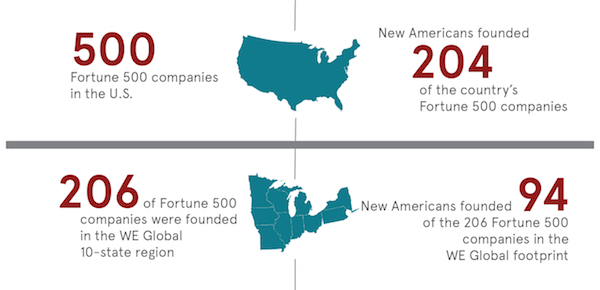
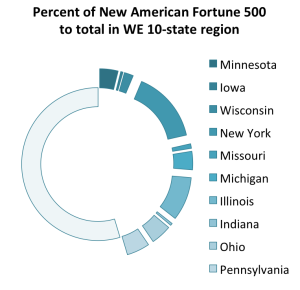 And finally, the 10 WE Global states account for 45% of all the New American Fortune 500 companies.
And finally, the 10 WE Global states account for 45% of all the New American Fortune 500 companies.
Across the Rust Belt, economic development initiatives and innovative strategies focused on attracting and empowering immigrant communities have taken root. The WE Global Network was formed to connect these efforts and to honor and embrace the Rust Belt’s legacy as a region of immigrants.
In many ways, the first step to empowerment is recognizing the strength of our heritage. Our immigrant ancestors were a main source of our economic strength in the 20th Century, and new immigrants to the United States have continued this tradition into the 21st.
Immigrant Heritage Month celebrates immigrant contributions from the past and present through stories and events nationwide. We encourage you to read the inspirational immigrant stories on the Welcome.us website and share your story too! You can also promote and participate in events happening near you and share the stories through Welcome.us’ Facebook, Twitter, and Youtube.
WE Global Network members are celebrating Immigrant Heritage Month across the Rust Belt. See what these communities are doing to honor immigrants and refugees this month:
- Buffalo – Mayor Byron Brown recognized June as Immigrant Heritage Month, and World Refugee Day Kicked Off With A Soccer Game At LaSalle Park.
- Cleveland – Through Global Cleveland’s Welcoming Initiative, old and new friends participated in a walking tour through the Cleveland Cultural Gardens on June 12th. On June 13th, Global Cleveland participated in La Placita Market in Cleveland’s Clark-Fulton neighborhood on the city’s west side – a traditional Hispanic market aimed at promoting the neighborhood’s Hispanic culture and fostering economic development. Global Cleveland held a private viewing for guests of a documentary featuring stories of recent immigrants to the United States. Global Cleveland wraps up their celebration with their monthly international meet-up dinner at Luchita’s Mexican Restaurant to celebrate Cleveland’s diversity – and amazing Mexican food. Check out Global Cleveland’s IHM stories!
- Columbus – The City of Columbus recognized Immigrant Heritage Month with City Council.
- Philadelphia – The Welcoming Center for New Pennsylvanians launched a 3-week campaign to share the Welcoming Center’s stories and raise funds to support new arrivals to establish themselves in America.
- Pittsburgh – All month long, Vibrant Pittsburgh has been sharing stories of immigrants in the Pittsburgh community, and created a series of videos highlighting the diversity in the region. Vibrant Pittsburgh also funded Pittsburgh’s World Refugee Day, and captured some of the fun! On June 1st, the City of Pittsburgh kicked off Immigrant Heritage Month with a special visit from USCIS Director León Rodríguez and an historic naturalization ceremony in City Council chambers, followed by the announcement of Mayor William Peduto’s Welcoming Pittsburgh Plan. Pittsburgh also launched their Spark! Film Series early this month, expanding their Cinema in the Parks free summer screenings to include six cultural films–previously only one cultural film was shown–in the hopes to spark an engaging community dialogue. Pittsburgh continues the celebration of Immigrant Heritage Month by inviting the public to City Hall to experience the journey of an undocumented immigrant in the Shared Border, Shared Dreams exhibit. Pittsburgh is excited to round out the month with the City’s first-ever Citizenship Day, to support Pittsburgh’s citizenship-eligible residents on their path to naturalization.
- St. Louis – Anna Crosslin of the International Institute St. Louis was honored Thursday by The White House as a “Champion of Change” – people who are making a difference in the lives of refugees in the U.S. and abroad. Anna has served as President and CEO of the International Institute of St. Louis for 37 years, and was instrumental in the founding of the St. Louis Mosaic Project, a nationally-recognized multi-sector led immigration attraction initiative and WE core member.
H-1B Day of Action Recap
/in All Blogs, Immigrant Entrepreneurs, Immigrant Entrepreneurship, H-1B Visas, Immigrant Retention /by gglnadminOn Thursday, April 9th, two days after the federal government closed the H-1B application process for FY 2016, WE Global Network members and partners across the region, especially our partners at the Great Lakes Metro Chambers of Commerce, joined together on a Day of Action to spread the word that immigrants can be a critical piece of our economic growth in the Midwest. Specifically, nearly a half dozen WE Global members held press conferences, issued press releases, and wrote letters to the editor highlighting that immigrants are helping Midwest companies fill unmet talent needs and providing our region some of the world’s best and brightest so that our local companies expand and are able to hire additional Americans.
The H-1B cap is not just an issue for Silicon Valley or the coasts. In fact, according to new research from the Brookings Institution, metro areas like Detroit and Chicago utilized more H-1B visas recently than Boston, the Research Triangle, or Seattle.
Yesterday, the federal government released the actual number of H-1B applications filed during the five-day period starting April 1, 2015 during which applications were accepted. Again, the nation’s demand for H-1B talent reached a new record high with 233,000 applications filed for the 85,000 visas. This is a 35 percent increase from the 172,5000 filed in April 2014. This is a pretty startling statistic when you consider that it can cost an employer some $5,000 to file the application and, based upon historic trends, employers are really only likely to have a 50 percent chance of their application winning the H-1B lottery (a chance that has declined to 36 percent this year).
In any event, last week’s WE Global efforts helped spread the word about this issue in areas of the country that may have lower immigration numbers and that may be unaware of the issue’s importance. Below is a collection of the media generated:
Cleveland
- Ohio.com Article
Buffalo
- Buffalo News article
Detroit
- Detroit Free Press Article and Editorial
- Detroit News Blog
- Crain’s Detroit Business Article
- Michigan Public Radio Story
- NBC News Story
Pittsburgh
- Pittsburgh Post-Gazette Editorial
- Press Release from Mayor Bill Peduto
- #BurghH1B Social Media
St. Louis
- St. Louis Business Journal Article
- Press Release from St. Louis Mosaic
- St. Louis Post-Dispatch Article
Toledo
- Welcome TLC April 9 social media postings
Study Highlights Need for Immigrant Inclusion in Revitalization of Main Streets
/in All Blogs, Immigrant Small Business Owners, Immigrant Entrepreneurs, Immigrant Entrepreneurship /by gglnadminThis past week, the Fiscal Policy Institute, in conjunction with the America’s Society and Council of the Americas (AS/COA) released groundbreaking new research about the importance and prevalence of America’s immigrants in building and sustaining Main Street commercial retail businesses. While only 13 percent of America, immigrants make up fully 28 percent of the owners of “Main Street businesses,” defined as retail, accommodation and food services, and neighborhood service businesses.
 More specifically, immigrant entrepreneurs own 58 percent of dry cleaners, 53 percent of grocery stores, 38 percent of restaurants, 32 percent of all clothing stores, 28 percent of department and discount stores, and 25 percent of electronics, radio, television, and computer stores. In short, this research suggests that as planners, government leaders, nonprofits, foundations, and others seek to develop and implement strategies to revitalize Rust Belt and Midwest cities, neighborhoods, and communities, as well as to continue the growth of downtown commercial districts, they had best consider the role that immigrants play, can play, and will play. Anything less is to turn one’s back to a significant source of investment, risk-taking, ingenuity, hard work, and opportunity.
More specifically, immigrant entrepreneurs own 58 percent of dry cleaners, 53 percent of grocery stores, 38 percent of restaurants, 32 percent of all clothing stores, 28 percent of department and discount stores, and 25 percent of electronics, radio, television, and computer stores. In short, this research suggests that as planners, government leaders, nonprofits, foundations, and others seek to develop and implement strategies to revitalize Rust Belt and Midwest cities, neighborhoods, and communities, as well as to continue the growth of downtown commercial districts, they had best consider the role that immigrants play, can play, and will play. Anything less is to turn one’s back to a significant source of investment, risk-taking, ingenuity, hard work, and opportunity.
These immigrant-owned Main Street businesses earn $13 billion annually, provide a critical source of first jobs for many in the American workforce, and “play an important role in generating neighborhood-level economic growth by making these areas attractive places to live and work,” according to the report.
On Wednesday, January 14, WE Global Network organizations from Detroit, Minneapolis/St. Paul, and Philadelphia attended the release of the study in New York City, including a roundtable discussion between the study’s author David Kallick and representatives from the three metros that received more in-depth treatment and analysis—Minneapolis/St. Paul, Nashville, and Philadelphia. The report compares 2000 and 2013 Census data noting that immigrants accounted for 48 percent of overall growth of business ownership in the U.S. during this time and all of the growth in Main Street business in 31 of the country’s 50 largest metropolitan areas and an impressive share of the increase in the remaining 19 areas. The number of immigrant Main Street business owners increased even in the seven metro areas (of the nation’s 50 largest) that saw an overall decline in Main Street business owners (such metros include Detroit, Birmingham, Columbus, Cleveland, Milwaukee, Providence, and Pittsburgh).
The study highlights the work of two WE Global Network core organizations—the Neighborhood Development Center (NDC) in Minneapolis/St. Paul and the Welcoming Center for New Pennsylvanians in Philadelphia. NDC is recognized for its culturally competent, comprehensive micro-enterprise training, lending, and incubator development work, including its Islamic law compliant, Reba free, loan fund. The Welcoming Center is praised for its work with entrepreneurs and neighborhood revitalization groups, including its work to diffuse racial and ethnic tensions in Philadelphia neighborhoods.
The WE Global Network has worked with the study’s author, David Kallick, who serves as the Director of Immigrant Research Initiative at the Fiscal Policy Institute, since our initial convening launching the Network in Detroit in June 2013. Traditionally, David has been helpful in tempering our descriptions of immigrant entrepreneurialism, critiquing our language about immigrant exceptionalism. Given our dialogue about the numbers, it was somewhat surprising and very encouraging to see such bold conclusions by the report. One should feel very confident in the study’s conclusions by such a rigorous researcher.
In addition to documenting the incredible impact immigrant Main Street businesses have had on American cities and neighborhoods, the report makes some important recommendations for local and state government, including:
- Establish a climate of welcoming
- Create a government office to address immigrant integration
- Provide a culturally competent business training and services
- Make sure programs are open to all
- Be attentive to the challenges undocumented immigrants face
- Take advantage of the valuable services refugee resettlement agencies offer
- Make financing innovative and community-based
- Link financing to training and business support
- Establish some incubators, especially commercial kitchens
- Improve licensing and inspections for everyone
- Use place-based development strategies to help Main Street businesses build neighborhoods
- Expand the reach of chambers of commerce and trade or interest groups
- Help manage cultural and economic tensions
- Pay attention to wages for workers
The significance of the study was highlighted in a Wall Street Journal story on it. We look forward to discussing the study’s contents and suggestions at the Third Annual Convening in Dayton. The importance of immigrants to the Main Street businesses of the Rust Belt and Midwest is evident in the winners of our Network’s “A Day in the Life of Immigrant Entrepreneurs” which features several Main Street business owners. In the coming months, we will continue to highlight the implementation of the strategies recommended by the report.

